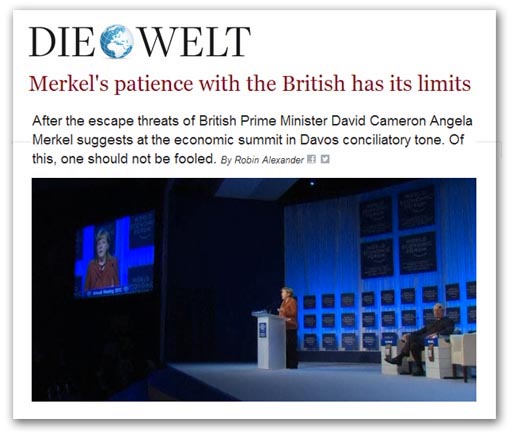However, Quentin Peel in the Financial Times thinks celebrations may be premature, and that Cameron is in danger of misreading Merkel. There is a long British tradition, he says, of failing to understand Berlin.
Although Merkel had sent a clear message from Berlin after Mr Cameron's speech on Wednesday, that Germany did not want the UK to leave the EU, she also told Cameron that, if he was just pursuing narrow national (or party) interests, this was a game everyone might play. The European game, she said, was about compromise.
Peel sees this as a warning to Cameron that he would not be able to dictate the outcome of any renegotiation, and it is not untoward to see it in that light. If Mr Cameron is to obtain a new treaty in time for it to be put to a referendum by the end of 2017, the "colleagues" are going to have to march to the drumbeat set by a British prime minister.
Before any substantial changes can be considered – and there is no worthwhile negotiation without substantial changes – there must under amendments added by the Lisbon Treaty, be a treaty convention. This, cannot be convened until after the next euro elections in 2014, and could hardly take less than two years.
That would bring us towards the end of 2016, with the convention resolutions then being circulated to Member States and the EU institutions, which must then draw up proposals for a draft treaty, convene an IGC, negotiate the treaty and agree a final draft.
This must all be done in time for Mr Cameron to proclaim victory and put the revised treaty to the people of Britain in time for the start of a referendum campaign. That would put the completion of the processes somewhere at mid-2017, requiring the "colleagues" to afford maximum priority to the British agenda, and to subsume their own political needs.
Unsurprisingly, therefore, we get Die Welt warming us that there is a limit to Merkel's patience. While she has adopted a conciliatory tone at Davos, this could very quickly change.
Peel reminds us that Merkel is already backing away from the need for big treaty change, and that she will do whatever she can without treaty change. She knows that French president François Hollande, her closest ally in Europe, is desperate to avoid any referendum in France.
For her part, Ms Merkel is still unclear about what Mr Cameron wants, adds Peel She wants to know if he is seeking – "for ideological reasons" – the repatriation of primary law (i.e., treaty changes), or whether he will be satisfied with "pragmatic" reduction of secondary legislation. She also wants to know if he is seeking to reduce unnecessary EU legislation for everyone, or just for the UK.
With that, it is clear that Merkel is not disposed to allow Cameron to set the agenda, just to resolve his own internal party differences. She knows as well as anyone that Labour's Miliband is not offering a referendum. Embarrassing Cameron at a critical time, refusing to contemplate negotiations, could give Labour the electoral edge, whence the referendum – and any idea of negotiations – disappear from the agenda.
Thus, says Die Welt, while Merkel is not going to do anything to push the British out of the EU, she is not going to do anything drastic to keep Britain in the fold. Any concessions to Cameron will be made on her terms, and she is not prepared to expend any political capital to help him out.
Come 2017, Mr Cameron - if he has been elected - may find he has no treaty, no victory and nothing to offer the people of Britain. What will he do then poor thing?
COMMENT THREAD
